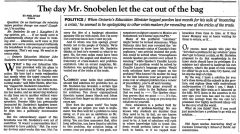“Why we must ‘contextualize’ hate,” Hill Times, 12 June, 2024.
An op-ed on the refusal in some quarters to take history into account when interpreting the Hamas attacks of October 7, 2023.
“Is climate justice a matter of taste?,” Transforming Society blog, June 7, 2022.
This piece applies insights from my Facts, Values, and the Policy World to critique the claim that “the question of climate justice is a matter of merely personal opinion.”
“The Rhetoric of McCloskey,” Challenge: The Magazine of Economic Affairs 58, no. 3, 2015: 251-61.
Until I shifted to his Capital and Ideology, I assigned portions of Thomas Piketty’s Capital in the Twenty-First Century to students in a couple of my courses. A student asked my opinion of Deirdre McCloskey’s attack on Piketty.
As I have devoted a lot of attention in recent years to the pathologies of political debates, I decided to analyse her work as a piece of rhetoric that obscures the substantive issues Piketty raises. It has been published in Challenge: The Magazine of Economic Affairs. The published version is available, behind a wall, here.*
The “Accepted Manuscript” (my final submitted version), is available here.
* (Those with access to Carleton University Library journals may access it free of charge here.)
“The per-vote subsidy: it’s the best deal in town,” Hill Times, 6 June, 2011.
An op-ed piece on the government’s decision to eliminate a policy that weakened the political power of deep pockets.
“The Problem with Holocaust Talk,” Briarpatch 32, no. 10, December 2003, p. 30.
I wish I had given this a different title: the problem is not talking about the Holocaust, but the disrespectful use of metaphors drawn from the Nazi era to criticize someone’s pet peeve.
Foreign Policy and the Culture of Complaint, Policy Options, September 2003.
The Liberal government’s 2003 decision not to take part in the invasion of Iraq led to much criticism from conservatives, and even from the American ambassador to Canada. This opinion piece reflects on the oddly plaintive tone of the criticisms.
“Ethics and Resignation: A Classroom Exercise,” The Journal of Policy Analysis and Management 22, no. 2 (2003): 313-15.
J.C. Thomson defines the “effectiveness trap” as “The inclination to remain silent or to acquiesce in the presence of the great men — to live to fight another day, to give on this issue so that you can be ‘effective’ on later issues.” This classroom exercise attempts to identify the conditions under which students are willing to reject this “effectiveness trap.” Students are first asked to “take a few minutes to think of a scenario that would lead you to resign from a government position. Specify the government position, and the issue that would provoke your resignation.” …
“Incrementalism: A Classroom Exercise,” The Journal of Policy Analysis and Management 22, no. 2 (2003): 315-18
“Reform implies form,” declared G.K. Chesterton. This certainly seems like common sense: if we want to reform a policy or an institution, it must be because we have a sense of how it can better fulfill its fundamental purpose. But incrementalism argues that this common sense is mistaken. This exercise helps students reflect on the issue.
“Comment: Gare, MacIntyre, and Tradition,” Environmental Ethics 22, no.2 (Summer 2000).
It is often argued that a proper concern for the environment requires an entirely new worldview. Thus, Arran Gare argues that “mainstream ethical philosophy” has little to offer the environmental movement. But to whom are such arguments addressed? One is either preaching to the converted or saying something like: “since your tradition prevents a proper appreciation of environmental values, you must abandon that tradition, in the name of environmental values.” But why would anyone change for the sake of values that they are supposedly incapable of appreciating?
This article argues that we would do better to “mine, and perhaps undermine, a wide variety of intellectual traditions from within.”
Comment: Simeon on sovereignty Policy Options, April 2000.
A short reflection on just what we might expect to happen should Quebec ever vote yes on an ambiguous sovereignty referendum.
“Discourse, Democracy (and Socialism?): A Reading of Habermas’s Between Facts and Norms,” Studies in Political Economy (Fall 1999).
An attempt to provide a readable introduction to, and critique of, one phase in the thought of Jürgen Habermas.
“Communication: On David Schlosberg’s ‘Communicative Action in Practice’,” Political Studies (1997) XLV, 853-54.
(Excerpt) “David Schlosberg uses the Alternative Dispute Resolution and Direct Action movements to shed light on some controversial aspects of Habermas’s theory of communicative action. Some of Schlosberg’s observations miss the mark, though his approach suggests interesting questions for further study… Though Schlosberg contrasts universalism with a positive view of ‘difference,’ the latter may be dependent on the former. The issue is just what people mean when they say that we must or should respect diversity. Is this an expression of taste, or a moral claim? …”
The day Mr. Snobelen let the cat out of the bag. Globe and Mail, October 10, 1995.
A case study of the value of March and Olsen’s “garbage can theory,” according to which solutions roam the world, anxiously searching for problems to which they might attach themselves.
“Market Reforms and Democratization: The Dilemmas of Eastern Europe and the Soviet Union,” Studies in Political Economy no. 34, Spring 1991, pp. 29-52.
“Perhaps to increase German sales of a book about the British economy, Marx prefaced the first German edition of Capital with the comment that ‘[t]he country that is more developed industrially only shows, to the less developed, the image of its own future.’ In seeking to understand the possible trajectory of Eastern Europe and the Soviet Union, where do we turn for an ‘image of its own future’? …”
(This was originally an early 1990 answer to a question on a Ph.D. comprehensive exam.)
Compassion or Expediency: The Overseas Selection of Central American Refugees. Ottawa: Office of Dan Heap M.P., 1988.
Shortly after returning to Canada in 1988, I was hired by Dan Heap, a Member of Parliament for the New Democratic Party, to study Canadian policies and practices governing the overseas selection of refugees from Central America. A limited number of copies of the study were printed, and it has never been available on-line. The events of Fall 2015, which highlighted the Canadian government’s indifference to the fate of Syrian refugees, led me to scour my hard drive to track down the scattered files comprising the study. I stitched the files together, leaving the content unchanged, and uploaded the study here.
[From the introduction] One of the very oldest Greek dramas is Aeschylus’s The Suppliants. Written perhaps as early as 500 B.C., the short play tells the story of a group of women who flee from Egypt to avoid forced marriages. Arriving at Argos, they seek admittance there as refugees. The king of Argos knows that one of the most important moral laws is that hospitality be shown to exiles, but he is fearful that by so doing he will provoke a powerful neighbour — the Egyptians. The king must choose between fulfilling a moral obligation and avoiding problems; between the right to security of the women and his own “national security”; between compassion and expediency.
The details change, but the choice remains the same. Compassion versus expediency; granting security to exiles versus protecting a vaguely-defined national security; meeting international obligations versus maintaining good relations with a powerful neighbour…
